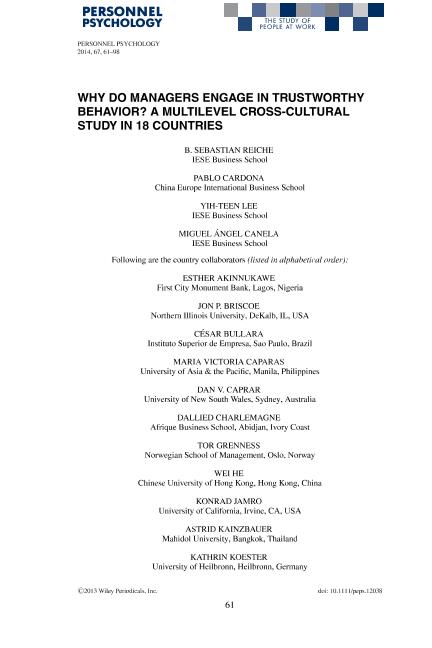Why do managers engage in trustworthy behavior? A multilevel cross-cultural study in 18 countries

Contenido multimedia no disponible por derechos de autor o por acceso restringido. Contacte con la institución para más información.
| Tag | 1 | 2 | Valor |
|---|---|---|---|
| LDR | 00000cab a22000004b 4500 | ||
| 001 | MAP20140022731 | ||
| 003 | MAP | ||
| 005 | 20140626100518.0 | ||
| 008 | 140626e20140501usa|| p |0|||b|eng d | ||
| 040 | $aMAP$bspa$dMAP | ||
| 084 | $a922.12 | ||
| 245 | 0 | 0 | $aWhy do managers engage in trustworthy behavior? A multilevel cross-cultural study in 18 countries $cB. Sebastian Reiche... [et al.] |
| 520 | $aDrawing on theories of generalized exchange and the norm of indirect reciprocity, we conceptualize subordinates¿ organizational citizenship behavior directed toward the organization (OCBO) and directed toward peers (OCBI) as antecedents of managerial trustworthy behavior and examine how managers¿ affective trust in subordinates mediates this relationship. We also investigate the extent to which this mediation is moderated by the level of collectivism in a society. Data were collected from 741 managers and 2,111 subordinates in 18 countries representing all major cultural regions of the world. We find support for our hypothesized moderated mediation in that managers¿ affective trust in subordinates mediates the relationships between both subordinates' OCBO and managerial trustworthy behavior, and subordinates¿ OCBI andmanagerial trustworthy behavior across the different countries studied. Further, managers¿ affective trust in subordinates only mediates the relationships between both types of citizenship behavior and managerial trustworthy behavior when collectivism is low to medium but not when it is high. Implications for research on cross-cultural psychology, trust, and organizational citizenship behavior are discussed | ||
| 650 | 4 | $0MAPA20080605742$aDirectivos de empresas | |
| 650 | 4 | $0MAPA20080598662$aRelaciones laborales | |
| 650 | 4 | $0MAPA20080550226$aConfianza | |
| 650 | 4 | $0MAPA20080618186$aRendimiento en el trabajo | |
| 650 | 4 | $0MAPA20080589165$aAspectos culturales | |
| 700 | 1 | $0MAPA20140010691$aReiche, Sebastian | |
| 773 | 0 | $tPersonnel psychology $dMalden : John Wiley & Sons, Inc$gVol. 67, issue 1,Spring 2014 ; p. 61-98 |

